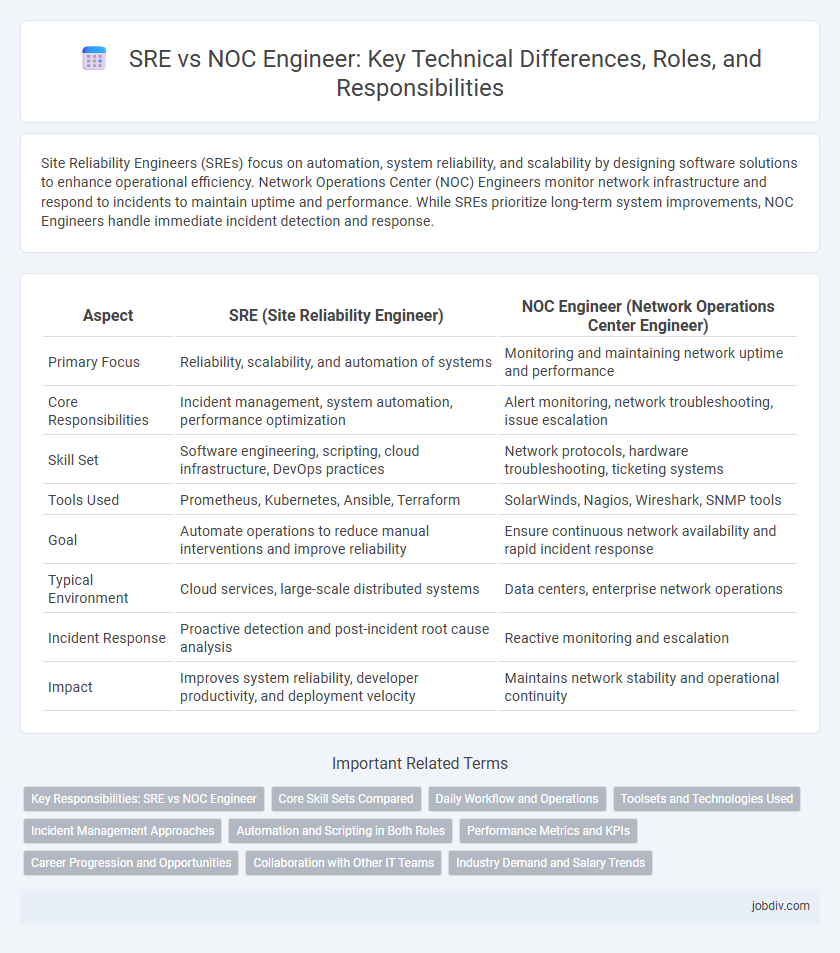Site Reliability Engineers (SREs) focus on automation, system reliability, and scalability by designing software solutions to enhance operational efficiency. Network Operations Center (NOC) Engineers monitor network infrastructure and respond to incidents to maintain uptime and performance. While SREs prioritize long-term system improvements, NOC Engineers handle immediate incident detection and response.
Table of Comparison
| Aspect | SRE (Site Reliability Engineer) | NOC Engineer (Network Operations Center Engineer) |
|---|---|---|
| Primary Focus | Reliability, scalability, and automation of systems | Monitoring and maintaining network uptime and performance |
| Core Responsibilities | Incident management, system automation, performance optimization | Alert monitoring, network troubleshooting, issue escalation |
| Skill Set | Software engineering, scripting, cloud infrastructure, DevOps practices | Network protocols, hardware troubleshooting, ticketing systems |
| Tools Used | Prometheus, Kubernetes, Ansible, Terraform | SolarWinds, Nagios, Wireshark, SNMP tools |
| Goal | Automate operations to reduce manual interventions and improve reliability | Ensure continuous network availability and rapid incident response |
| Typical Environment | Cloud services, large-scale distributed systems | Data centers, enterprise network operations |
| Incident Response | Proactive detection and post-incident root cause analysis | Reactive monitoring and escalation |
| Impact | Improves system reliability, developer productivity, and deployment velocity | Maintains network stability and operational continuity |
Key Responsibilities: SRE vs NOC Engineer
SRE engineers focus on automating system reliability, building scalable infrastructure, and developing monitoring tools to proactively prevent outages, ensuring service level objectives (SLOs) are met. NOC engineers primarily handle real-time incident detection, troubleshooting network and system alerts, and coordinating rapid response to maintain uptime and operational continuity. Both roles emphasize uptime, but SRE integrates software engineering principles to drive reliability, while NOC centers on operational monitoring and incident management.
Core Skill Sets Compared
SRE engineers specialize in software engineering principles, automation, and reliability metrics such as SLIs, SLOs, and error budgets to enhance system performance and scalability. NOC engineers focus on real-time monitoring, incident detection, and basic troubleshooting to maintain network uptime and respond promptly to alerts. While SREs leverage coding skills and infrastructure as code, NOCs primarily employ tools for network management and alert escalation protocols.
Daily Workflow and Operations
SRE engineers focus on automating infrastructure, monitoring system reliability, and implementing code to prevent incidents, using tools like Prometheus and Kubernetes for efficient operations. NOC engineers primarily monitor network performance, manage alerts, and execute predefined escalation protocols to ensure uptime and resolve issues quickly. Both roles emphasize incident management, but SRE combines development and operations to improve scalability, whereas NOC centers on real-time network and system monitoring.
Toolsets and Technologies Used
SREs primarily utilize automation and orchestration tools such as Kubernetes, Terraform, and Prometheus to enhance reliability and scalability, focusing on proactive incident management and performance monitoring. NOC Engineers rely heavily on network monitoring tools like Nagios, SolarWinds, and Wireshark to ensure uptime and manage real-time alerts within infrastructure operations. Both roles leverage scripting languages like Python and Bash, but SREs emphasize CI/CD pipelines and infrastructure-as-code for continuous improvement.
Incident Management Approaches
SRE engineers implement proactive incident management by leveraging automation and real-time monitoring to detect and resolve issues before customer impact occurs. NOC engineers focus on reactive incident handling, prioritizing rapid identification and escalation of network and infrastructure outages. Both roles aim to minimize downtime, but SRE emphasizes maintaining service reliability through engineering solutions, while NOC centers on operational alert response and troubleshooting.
Automation and Scripting in Both Roles
SRE engineers prioritize automation through advanced scripting languages like Python and Go to build scalable, self-healing systems that reduce manual intervention and enhance reliability. NOC engineers utilize scripting primarily for monitoring, alerting, and routine task automation, often employing tools like Bash and PowerShell to streamline incident response and improve operational efficiency. While both roles leverage automation, SREs drive proactive infrastructure improvements, whereas NOC engineers focus on reactive system maintenance and rapid issue resolution.
Performance Metrics and KPIs
SRE engineers prioritize performance metrics like service latency, error rates, and system uptime to ensure reliability through proactive monitoring and automation. NOC engineers focus on operational KPIs such as incident response times, ticket resolution rates, and network availability to maintain stable IT infrastructure. Both roles utilize metrics and KPIs tailored to their specific objectives for optimizing system performance and minimizing downtime.
Career Progression and Opportunities
SRE engineers typically advance by deepening expertise in software engineering, automation, and reliability, moving towards roles like Site Reliability Architect or DevOps Manager, which emphasize system scalability and efficiency. NOC Engineers often progress into senior monitoring roles or network operations management, focusing on incident response, network performance, and infrastructure stability. Career growth for SREs usually offers broader opportunities in software development and cloud-native technologies, while NOC Engineers find advancement primarily within network and system operations domains.
Collaboration with Other IT Teams
SREs collaborate closely with development teams to implement automated monitoring and incident response, ensuring system reliability through proactive problem-solving and continuous improvement. NOC Engineers primarily coordinate with operations and support teams to monitor network conditions and quickly respond to incidents, facilitating efficient troubleshooting and escalation processes. Both roles require effective communication and shared tools to maintain system performance and minimize downtime.
Industry Demand and Salary Trends
SRE (Site Reliability Engineer) roles have seen a significant rise in industry demand due to their expertise in automation, reliability, and large-scale system management, often commanding salaries between $120,000 to $160,000 annually. NOC (Network Operations Center) Engineers remain essential for real-time monitoring and network troubleshooting, with salaries generally ranging from $60,000 to $90,000, reflecting a steadier but less rapidly growing market. The shift towards cloud-native architectures and DevOps practices drives SRE salary premiums and demand, while NOC roles are evolving to support hybrid and multi-cloud environments.
SRE vs NOC Engineer Infographic

 jobdiv.com
jobdiv.com